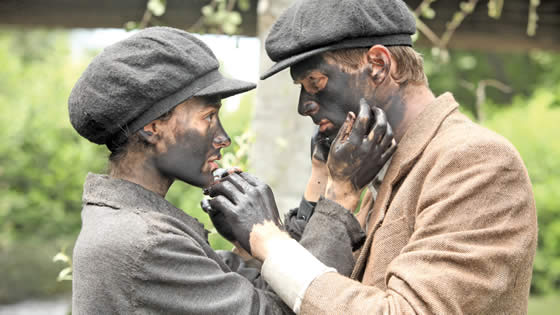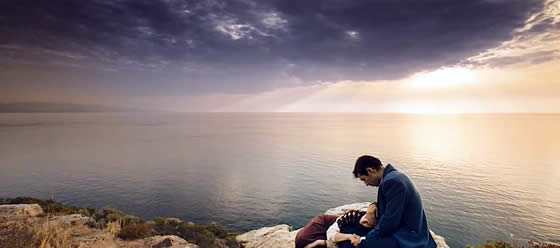 The Butterfly’s Dream directed and written by Yilmaz Erdoðan is Turkey’s OSCAR entry for the Best Foreign Language Award Film. The Butterfly’s Dream centers on two young poets in the 1940s of Turkey who make a bet on a pretty girl. Whoever’s poem the girl likes will win, and the other will step aside. The poets however have to deal with other problems like disease, poverty, compulsory work in the mines and the Second World War in the meantime. As the story unravels, the poets travel through cities and events in search of happiness. Is it the optimist who’s the bravest or the pessimist?
The Butterfly’s Dream directed and written by Yilmaz Erdoðan is Turkey’s OSCAR entry for the Best Foreign Language Award Film. The Butterfly’s Dream centers on two young poets in the 1940s of Turkey who make a bet on a pretty girl. Whoever’s poem the girl likes will win, and the other will step aside. The poets however have to deal with other problems like disease, poverty, compulsory work in the mines and the Second World War in the meantime. As the story unravels, the poets travel through cities and events in search of happiness. Is it the optimist who’s the bravest or the pessimist?
Bijan Tehrani: How did you come up with the idea for the Butterfly’s Dream?
Yilmaz Erdoðan: I had two ideas about my work, first I began writing with poetry, and my background is theatre and comedy. But these two sides, I wanted to join them together, when I heard my poet, from Zonguldak, I thought that this was a story that I wanted to join and show. The emotional part was important in this, I read these, poems and they are very, very good, they are genius, they were written by brother who have since past away, but we did not hear anything about them in school, so they were totally forgotten, this was not right and I wanted to fix it actually.
BT: I think that this is a very important issue, because it touches on talents who have died before they were born, I think your film is addressing this issue.
YE: Definitely but on the other hand, we show that they just wrote and they are living in Los Angeles right now, as I said before my movie does not have a happy ending, but the film itself became a happy ending because they wanted to publish, they wanted to know and they did.
BT: I understand that this film is based on a true story, how close were you to the real life story and how much research did you do?
YE: Too much research, I told you that they were forgotten, the first thing I wanted was to go to Zonguldak, so I went there and I met some people and asked if they knew Rustu Onur and Muzaffer Tayyip they are the two poets, one is more famous than the other in Zonguldak, they know him, they are fond of him and a few people are still looking for him. I met some old guys and they remember and we stopped talking and after five years it became a movie and after five years I wrote and researched, I did two movies in that time.
BT: How did you go about casting the film?
YE: I did a lot of auditions, maybe twenty or thirty; it was just asking myself questions about who could fit each role. One day I met with Kivanç Tatituð, actually it was about another project and I told him that I have a story about two poets and their virtues, but he had to lose a lot of weight, he said that he was very interested and we began to discuss. His face is very familiar to the real character, it was a wonderful thing. We started working and talking about acting and poetry and what poetry really is, and trying to figure out the characters, we read their life stories and it was a wonderful process. Belçim Bilgin is my wife but it was before I met him at that time. Those were the first three actors, for myself, the directing part was very hard but it was great.
BT: How did you come up with the visual style of the film?
YE : It was a real place with real characters and real people, and it was a strong story with strong synergy for us because people know what we are following and Zonguldak itself is a interesting city, outside is paradise, Green, Blue everything, fantastic Mediterranean city but underground it is another story, there was a lot of irony, for poetry, for a pad, the visuals are like food for our pad, so there is a lot of inspiration, so for filmmakers it is wonderful and real location. The visual style made the actors very mindful of their surroundings and made for some very real and honest performances.
 BT: What do you think are your film’s chances for getting nominated or even winning the Academy Award for best foreign language film?
BT: What do you think are your film’s chances for getting nominated or even winning the Academy Award for best foreign language film?
YE: This is the Academy Awards and we have at least 80 wonderful storytellers and filmmakers from around the world, so I am not sure. Maybe if we go to the shortlist, movies are about messages, cinematography and technical things are wonderful but the message is the core and we are saying something, it depends. Poetry is not a foreign language, there are not any foreign people, we are speaking differently but we are saying the same thing. Poetry is our common language.
BT: What is the next project you are working on?
YE: After “The Butterfly’s Dream” I wrote a script, and another director, my friend is filming it, it is called “The Boss Wants a Happy Ending”.
BT: How has the audience reaction been to the film?
YE: It was wonderful actually, it was really wonderful, after the screening we did Q&A and we had some good signs and it was very emotional and I felt that this message was being evoked to the audience. It was interesting because I gave them example about poetry, I said that poetry was never poetic, like rain, rain is a gift and a miracle and they realized what I meant. After the screening we went out and it started raining and they panicked, but I told them we should celebrate because it never rains in Los Angeles.

